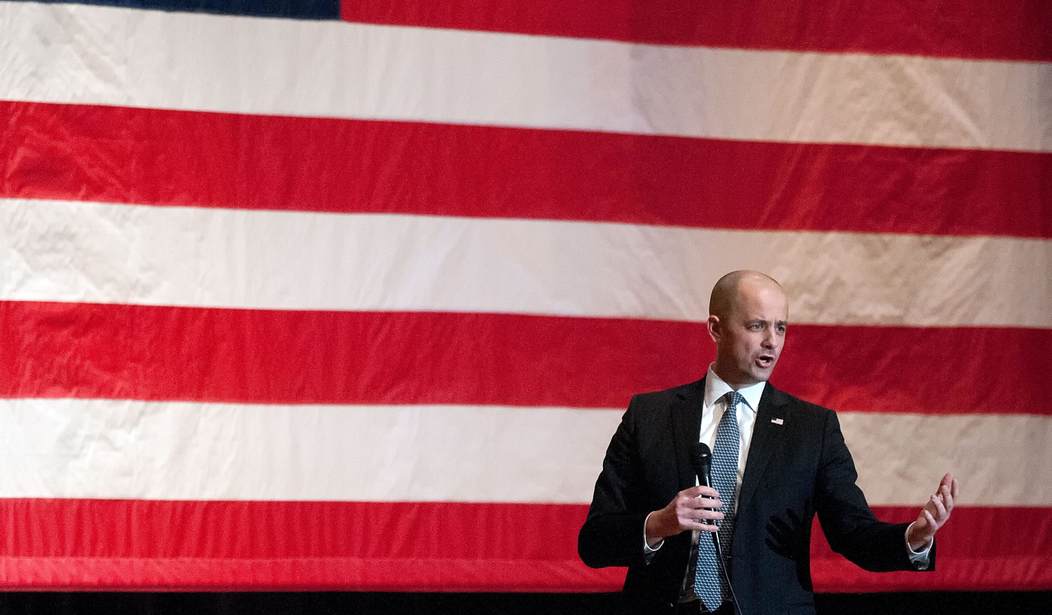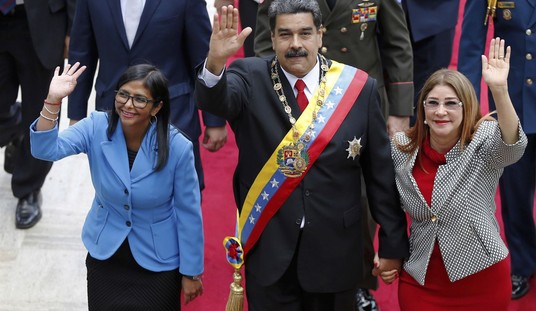This is a tragic year for constitutional conservatives, and I would argue that there are good reasons to vote for Donald Trump, Hillary Clinton, Gary Johnson, Jill Stein, and Evan McMullin. McMullin is the newest and least known of these candidates, and he is only contesting a handful of states. Nevertheless, there is reason to think he is the most viable third-party candidate, and the best representative of conservatism.
McMullin has no elected experience, and he only has a realistic chance of winning a state or two. Nevertheless, there are good reasons to vote for him. Here are five.
1. McMullin can win.
In a presidential election, electoral votes matter more than the popular vote. This is why George W. Bush won in 2000, despite the fact that more people voted for Al Gore. In order to win, a candidate has to rack up a majority of the electoral votes available — 270 this year.
If neither Donald Trump nor Hillary Clinton wins 270 electoral votes, the election moves to the House of Representatives, where the delegations of each state vote for one of the top three candidates who won electoral votes.
McMullin’s strategy is to win just enough electoral votes to take that third slot. To do so, he only has to win one state — and he’s already beating Trump and Clinton in the polls for his home state of Utah. If he wins there, and if neither Trump nor Clinton wins 270 electoral votes or more (which is looking less and less likely), voting goes to the House of Representatives, where Never Trump Republicans could give McMullin a real shot.
If you live in Utah, you should definitely consider this independent candidate. Even if you don’t live in a state McMullin can win, giving him more votes will give added incentive for representatives in the House to support his long-shot bid.
2. A moral man.
In 2012, Americans chose between two men who were both happily married, never divorced, and who had no history of blackmailing alleged victims of sexual assault. What a difference four years makes!
On the left stands Hillary Rodham Clinton, who has blackmailed numerous women who claimed to have been abused by her husband. She dismissed their complaints as “bimbo eruptions,” and later went on to self-righteously declare, “to every survivor of sexual assault… you have the right to be heard. You have the right to be believed.” The “right to be believed” language was removed from Clinton’s campaign website following a viral tweet from her husband’s accuser, Juanita Broaddrick.
On the right stands Donald J. Trump, whose notorious comments about abusing women unleashed a firestorm among the Religious Right, once known as the “Moral Majority.” Trump, despite claiming to be a Christian, has bragged about sleeping with other men’s wives, ended two marriages by cheating with women, and said he has never felt the need to ask God for forgiveness. Oh, and there was that time he called Jesus an egomaniac.
Compared to these two moral reprobates, Evan McMullin comes across as a saint. A lifelong Mormon, he adheres to a tight moral code, much like former Republican nominee Mitt Romney. When Maggie Gallagher took to National Review to warn against McMullin, she still had to admit he is at least “a very good man and a patriot.”
I’d take the good man over the philanderer and the corrupt enabler any day.
Next Page: A CIA counter-terrorist in charge of national security? Sign me up.
3. The national security candidate.
Donald Trump may chant “America First,” but does he really understand the nuances of America’s unique and dangerous position in the world? Hillary Clinton may have experience as secretary of State, but is it really good experience?
In classic Trump fashion, the Republican nominee has thrown out all sorts of harebrained ideas, from encouraging nuclear proliferation to telling America’s allies to pick up the slack for their own defense. He has notoriously refused to rule out the use of nuclear weapons, and while he pledges to defeat the Islamic State, he has also vowed to violate the Geneva Conventions by going after the families of terrorists. Trump is unpredictable, but he is also inexperienced.
While Trump is too much of a novice, Clinton is too much of a status-quo politician. As the New York Times‘ Ross Douthat explained, the dangers of a Clinton presidency are “the dangers of elite groupthink, of Beltway power worship, of a cult of presidential action in the service of dubious ideas.” This “establishmentarian type of folly” has spawned “almost every crisis that has come upon the West in the last 15 years,” and on every major issue, Clinton was there with shifting elite opinion: for Iraq, against Iraq, for the Arab Spring, for intervention in Libya, against opposing Putin when it mattered.
McMullin presents a unique mix of the benefits of each candidate. He worked for the CIA from 2001 to 2011, working overseas on terrorism and intelligence operations in the Middle East, North Africa, and South Asia. He was an undercover operations officer with the National Clandestine Service. In short, Evan McMullin was a spy.
This means that he knows secrets few politicians have the clearance to learn, and he is also fundamentally unpredictable. He has Trump’s unpredictability with an international knowledge possibly better than Clinton’s.
McMullin also has a philanthropic view of American foreign policy. As Gallagher noted, his Facebook posts suggest he cares deeply about genocide and female genital mutilation — and thinks America should act to stop them. He served as senior adviser on national security issues for the House Committee on Foreign Affairs from 2013 to 2015, before he became chief policy director of the House Republican Conference (the job he had last before running for president). This might make him too much of a hawk, but it echoes President George W. Bush’s concern for AIDS.
Despite these positives, McMullin might prove less reliable in denouncing radical Islamic terrorism. He has warned against Muslim-bashing and insisted that “refugees are not terrorists.”
Nevertheless, there is reason to think he understands the threat well from his experience, even if he speaks about it in a politically correct way. He told National Review in August that ISIS terrorists “eat, drink, and sleep to destroy us.” He explained his political correctness persuasively, arguing that “Muslims actually play a critical role in our counterterrorism efforts.”
For these reasons, he seems the most trustworthy candidate on foreign policy — which actually is the most important job of the president.
Next Page: Free markets, federalism, and limited government.
4. McMullin is an economic conservative.
When Maggie Gallagher examined three years of McMullin’s Facebook posts, she discovered that his “survival kit” for the snowstorm in January of this year featured F.A. Hayek’s The Road to Serfdom and Milton Friedman’s Capitalism and Freedom. Few books lay out the case for the free market in the modern world better than these two, and it is heartening to see a presidential candidate reading them.
Snowpocalypse survival kit. And, yes, mini corn dogs.
Posted by Evan McMullin on Friday, January 22, 2016
Donald Trump’s economic ideas seem to boil down to tax cuts and better trade deals. While tax cuts are important — especially for America’s outrageously high corporate tax rate — they work best if paired with decreased regulations and free trade. While Trump also claims he will rein in administrative agencies like the EPA, his record of using government loopholes in private business suggests a willingness to work with the broken system, rather than fixing it head on. If he were to win, I would hope to be proven wrong, but a simple Google search on eminent domain suggests otherwise.
Clinton, on the other hand, claims outwardly to back Bernie Sanders-style socialism, with higher taxes, heftier regulations, and less trade. As president, she would be less likely to be quite so bad for economic growth — her corruption and paid speeches to Wall Street firms suggest a willingness to work with big businesses more like crony capitalism than full-blown socialism.
McMullin worked in the Investment Banking Division at Goldman Sachs, and his close relationships with Republicans in the House of Representatives (John Boehner and Paul Ryan) might suggest an “establishment” bent to his views and policy.
Nevertheless, his familiarity with the ideas of Hayek and Friedman fits with his support for micro-loans to make African women into successful entrepreneurs — a kind of free market humanitarianism which helps poor countries without leading to unintended negative economic consequences. McMullin seems to understand free market principles better than Trump or Clinton, and while that isn’t exactly saying much, it definitely counts in his favor.
5. Federalism and congressional power.
In his August interview with National Review, McMullin emphasized limited government and federalism.
He pledged to sign the REINS (Regulations From the Executive in Need of Scrutiny) Act, which would require any major regulation from an administrative agency to pass the U.S. House of Representatives and the U.S. Senate. This would return lawmaking power to where the Constitution says it belongs: the Congress, as opposed to administrative agencies.
McMullin also emphasized states’ rights. “I’m talking about states having the ability to chart their own course to a greater degree, which may mean Vermont does something absolutely wild that Utah wouldn’t want to do,” the candidate explained. He argued that neither Trump nor Clinton would oppose the ever increasing consolidation of executive power.
“What about Donald Trump makes you think he is comfortable giving power to anyone? Hillary? Absolutely not,” McMullin declared. “We have to let the competition of ideas and democracy play out among the states. At the federal level it’s a monopoly of power. … There’s no real competition, and that’s part of why we have the problems we have now.”
While McMullin’s emphasis on limited government echoes some of the policies supported by Libertarian Gary Johnson, the independent criticized Johnson for failing to “understand religious liberty,” and he criticized the Libertarian’s penchant for using marijuana.
“The power comes from the people,” McMullin declared. “The government reports to the people, is responsible to the people, and I think we need leadership that reflects those basic fundamental — and I would say universal — principles.”
The returning of power to the states and to the Congress are fundamental conservative issues, and it is heartening to hear a presidential candidate emphasize them.
Some have criticized him for refusing to make opposition to gay marriage a litmus test for potential Supreme Court nominees, and this is a serious criticism. Nevertheless, his positives seem to outweigh such negatives, in this harrowing election year.
While McMullin may be too close to the establishment Republicans who have weakened the party’s appeal, he arguably represents the most moral candidate, the most trustworthy on national security, and a very solid option for the conservative issues of free markets and limited government. Overall, he represents the best viable option for conservatives in a very trying election.









Join the conversation as a VIP Member